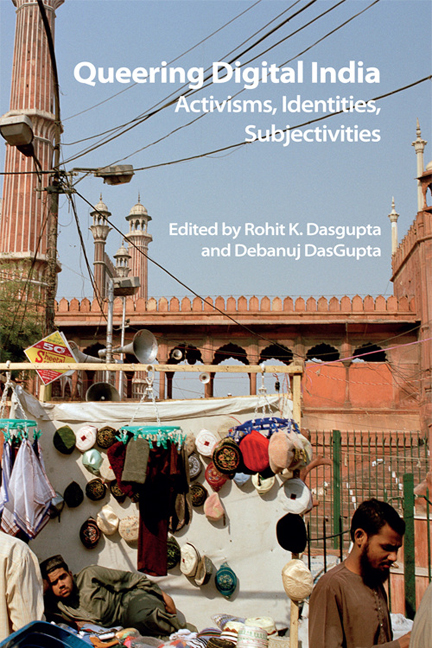10 - Kashmiri Desire and Digital Space: Queering National Identity and the Indian Citizen
Published online by Cambridge University Press: 28 April 2021
Summary
Introduction
The ‘invisiblising’ of the Kashmiri desire for Azadi (Freedom) is ‘queer’ in response to the Indian postcolonial state's reproduction of a normative ‘upper caste’, ‘Hindu’, ‘heterosexual’ subject. Postcolonial nation states such as India are patriarchal through the punishing of sexual difference as well as other differences such as ethnic identities, which are considered in contravention to the interests of the nation-states (or monstrous as Dasgupta and DasGupta argue in the Introduction to this volume). In this sense, experiences of queerness could be extended to the understanding of how other political identities do not conform to the ‘state-approved’ idea of Indian citizenship and how these bodies come to be cordoned for death. The state, conspicuously through modes of disciplining and punishment, engages in creating its ‘acceptable’ citizens. The political identity of a Kashmiri is similar to that of a queer sexual identity as both do not conform to the image of the ‘ideal’ Indian citizen and are constantly shaped in their relationship with the imagined Indian nation-state. The chapter foregrounds theoretical formulations of sexual citizenship, queer theory and cultural studies, which argue that bodies that resist ‘self-disciplining’ in an attempt to acquire favourable citizenship become an ultimate test of the limits of the sovereignty of the state. Here necropolitics becomes inevitable. The normative identity subject, whether in terms of sexuality or religious/ethnic diversity has its ‘other’, and both sexuality and ethnic difference come to inhabit this space of ‘otherness’.
Furthermore this chapter demonstrates how the ‘Kashmiri body’ signifies populations cordoned for death and an excess to the Indian nation-state. The use of the internet represents a site of ‘coming out’ of the Kashmiri desire for freedom. I analyse this ‘coming out’ of the Kashmiri desire as a desperate response to the Indian corporate media's complicit siege over happenings in Kashmir's mass uprising in 2010 (Bukhari 2010). I will then delineate how the Indian state's military operations in Kashmir are a form of queer necropolitics that seeks to erase Kashmiri desire (political or sexual). Even though ‘Kashmiri desire’ widely circulates through the internet, Kashmiri bodies and their politics continue to be violently regulated and killed en masse.
- Type
- Chapter
- Information
- Queering Digital IndiaActivisms, Identities, Subjectivities, pp. 180 - 194Publisher: Edinburgh University PressPrint publication year: 2018



